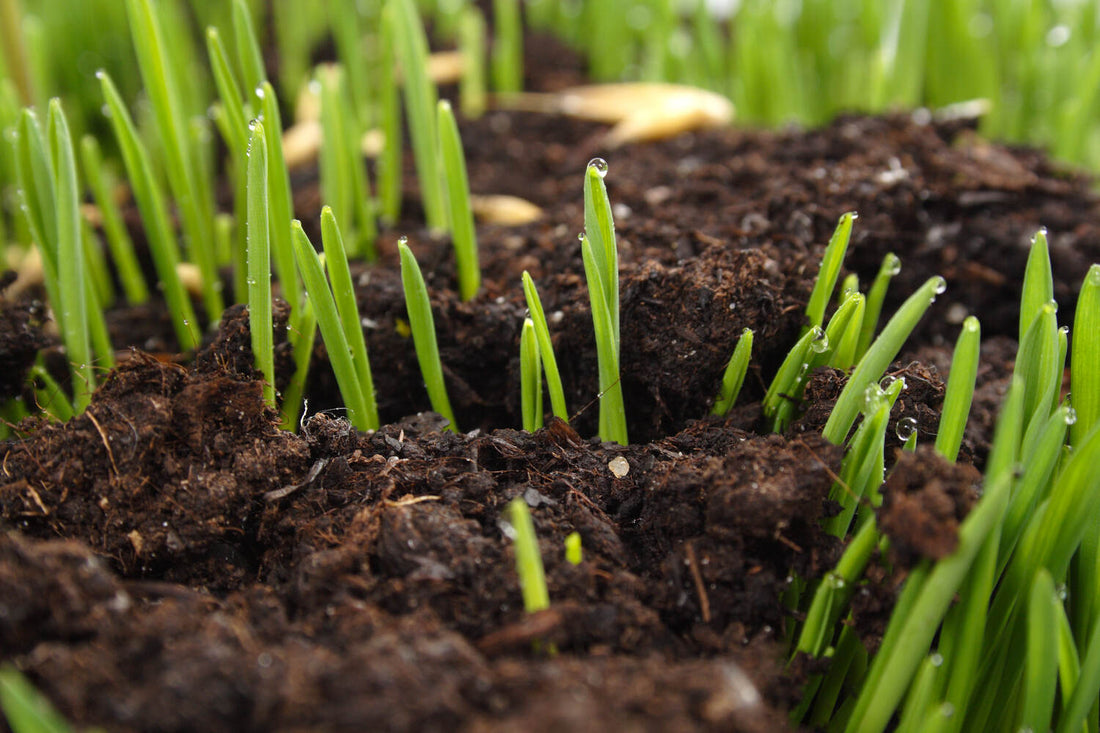Are you tired of looking at a lackluster lawn? As lawn care experts at Lawn Synergy, we know that fertilizing your lawn is one of the best ways to ensure a healthy, lush, and vibrant yard. If you're wondering what does fertilizer do for grass, you've come to the right place.
In this article, we'll dive deeper into how lawn fertilizers work, the benefits they provide, and the best practices for applying them.
From our experience, a well-fertilized lawn not only looks great but also resists diseases and withstands environmental stresses better than an unfertilized one.
So, if you're ready to transform your lawn into a green paradise, continue reading. Let's explore the world of fertilizers and discover how they can make your grass thrive.
What this article covers:
- What Is Fertilizer?
- What Happens to Your Grass When You Fertilize
- Knowing the Essential Nutrients
- Which Fertilizer Should You Choose?
- When Should You Apply Fertilizer
What Is Fertilizer?
Fertilizer is a nutrient-packed solution designed to enhance the health and growth of your lawn. It typically contains essential nutrients like nitrogen, phosphorus, and potassium, which are vital for the development of grass.
Fertilizer provides the necessary elements that might be lacking in the soil, ensuring your lawn gets the right balance of nutrients.
These nutrients promote healthy root development, robust growth, and vibrant green color. Using the right fertilizer can make a significant difference in the appearance and resilience of your lawn, making it more resistant to diseases and environmental stresses.
Proper application of fertilizer results in a thicker, lusher lawn that not only looks great but also contributes to a healthier environment by absorbing more carbon dioxide and producing more oxygen.

What Happens to Your Grass When You Fertilize
Curious about what happens to grass when you fertilize? Let's look at a few things that fertilization does for your grass:
Essential Nutrients Are Provided
As lawn care experts, we know that grass requires a balanced mix of nutrients to grow thick and strong. Fertilizers deliver these nutrients directly to the soil, ensuring your grass gets what it needs to thrive.
This includes primary nutrients like nitrogen, phosphorus, and potassium, which are crucial for various growth processes.
Nitrogen promotes healthy leaf and stem growth, phosphorus supports root development and energy transfer, and potassium enhances overall plant health and disease resistance.
Additionally, fertilizers provide secondary nutrients and micronutrients that are essential for optimal growth.
Using the right fertilizer can significantly improve the appearance and resilience of your lawn, making it lush, green, and more resistant to adverse conditions.
Your Grass Greens Up
Who doesn't love a lush, green lawn? Applying the best fertilizer to make grass green, such as the Emerald 10-0-20 Lawn Fertilizer, can quickly turn a dull lawn into a vibrant one.
Nitrogen is particularly crucial for this, as it promotes healthy leaf growth and enhances the green color of your grass.
When nitrogen is adequately supplied, it stimulates the production of chlorophyll, which is responsible for the green pigmentation in grass.
This leads to a noticeable improvement in the lawn's overall appearance, making it look more lively and inviting. Regular application of the right fertilizer ensures that your lawn remains green and lush throughout the growing season.

Your Grass Becomes Disease Resistant
From our experience, a well-fertilized lawn is more resistant to diseases. Fertilizers help to strengthen the grass, making it less susceptible to common lawn diseases.
By providing essential nutrients, fertilizers improve the grass's immune system, enabling it to fight off pathogens more effectively.
This means fewer brown patches and more consistent growth throughout the year. Healthy, well-nourished grass can better withstand attacks from fungi, bacteria, and pests, reducing the need for chemical treatments.
Regular fertilization not only promotes vigorous growth but also contributes to a more resilient and disease-free lawn, ensuring it remains beautiful and healthy.
Knowing the Essential Nutrients
Understanding the essential nutrients in fertilizers is key to selecting the right one for your lawn. Here's a quick rundown:
- Nitrogen (N): Promotes leaf growth and green color. Nitrogen is crucial for the development of lush, green foliage. It stimulates the production of chlorophyll, which is essential for photosynthesis, the process by which plants convert sunlight into energy. Lawns with adequate nitrogen are often vibrant and healthy.
- Phosphorus (P): Supports root development and flower/seed production. Phosphorus is vital for the establishment of strong root systems. It aids in the energy transfer processes within plants, which is necessary for the growth and development of roots, flowers, and seeds. Lawns with sufficient phosphorus are better equipped to absorb nutrients and water from the soil.
- Potassium (K): Enhances overall plant health and disease resistance. Potassium strengthens plant cell walls, improving the grass's ability to withstand environmental stresses such as drought, extreme temperatures, and diseases. It also aids in the movement of water and nutrients within the plant, ensuring that all parts of the grass get the nourishment they need.

Which Fertilizer Should You Choose?
Choosing the right fertilizer depends on several factors, including the type of grass you have and the current state of your lawn.
Different grass types have specific nutrient needs, and your lawn's health can dictate whether it needs more nitrogen, phosphorus, or potassium.
For those wondering about fertilizer or grass seed first for new lawns, it's usually best to start with the fertilizer to prepare the soil. This ensures that the soil is rich in nutrients, creating an optimal environment for the new grass seed to thrive.
Additionally, the best fall lawn fertilizer can help your lawn recover from summer stresses and prepare for the colder months ahead. Fall fertilizers typically have a higher potassium content to strengthen the grass for winter.
Selecting a fertilizer tailored to your lawn's specific needs can result in healthier, more resilient grass that looks great year-round.
When Should You Apply Fertilizer
Timing is crucial when it comes to fertilizing your lawn. Applying fertilizer at the right time ensures maximum absorption and effectiveness.
Generally, spring and fall are the best times to fertilize, but this can vary depending on your local climate and the type of grass you have.
In early spring, apply fertilizer to help your grass wake up from dormancy and start growing vigorously. As the grass begins to green up and grow actively, it will absorb the nutrients more effectively.
For fall, fertilizing helps strengthen the grass's roots and prepare it for winter, ensuring it remains healthy and robust.
It's important to avoid fertilizing during extreme weather conditions, such as during a drought or a heatwave, as the grass may not be able to take up the nutrients properly.
Always consider your specific grass type and local climate conditions to determine the optimal fertilization schedule for your lawn.
Conclusion
A lush, vibrant lawn doesn't happen by chance; it requires proper care and attention, with fertilization playing a pivotal role.
Fertilizing your lawn is an essential part of lawn care. It provides the nutrients your grass needs to stay green, healthy, and disease-resistant.
The right fertilizer, applied at the optimal times, can transform your yard into a stunning, resilient landscape. It's crucial to water your lawn appropriately to avoid issues.
At Lawn Synergy, we're dedicated to helping you achieve the lawn of your dreams. Explore our expert advice and quality products to take your lawn care to the next level. Trust Lawn Synergy to guide you every step of the way to a beautiful, thriving lawn.
If you want to learn more, why not check out these articles below:
- What Lawn Fertilizer Is Safe for Well Water
- What Happens If You Apply Fertilizer to Wet Grass
- Will Fertilizer Burn Grass If Not Watered
- Grass Care
- Germination of Grass Seed
- How Does Grass Grow?
- How Much Fertilizer for Lawn?
- Will Fertilizer Kill New Grass?
- How Long Does Lawn Fertilizer Take to Work?
- How to Grow Grass Quickly in Summer
- How to Grow Bermuda Grass
- How to Grow Grass an a Slope
- How to Grow Grass in AZ
- How to Spread Lawn Fertilizer
- How to Fertilize Lawn in Spring


